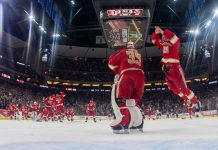
TAMPA, Fla. — When the Denver Pioneers took the ice for the last practice of the day Wednesday at Amalie Arena, it seemed the intensity level was up compared to the practices of the other three teams.
At one point, Denver rotated through all of its lines and defensive combos in five minutes of back-and-forth simulated game play.
“That’s just the way we practice,” said Denver coach Jim Montgomery. “I think a lot of our personality on the ice in games comes from our personality in practice. And a lot of it emanates from me. Intensity is what I was about as a player. And as a coach, I think to get these guys to realize that all this type of stuff, it’s awesome that we have so many journalists here and that we’re on so many different websites, but we’re not used to that. So we’ve got to get back to what matters most, and that’s our preparation, and if we’re business-like, and especially if I’m business-like, I think it gets our players on the right page.”
From an experience and success standpoint, Boston College coach Jerry York leads the way, as he was won five national titles — four with BC and one with Bowling Green. BC also has 14 players with previous Frozen Four experience who were on the 2014 squad that lost to Union in Philadelphia. North Dakota has been to three straight Frozen Fours, and has 16 skaters from those teams, as well as coach Brad Berry, who was an assistant the last two years. Quinnipiac played in its only Frozen Four in 2013, losing the national championship to Yale, and has seven seniors who played on that team.
Denver, by contrast, hasn’t made a Frozen Four since 2005, the last year it won the national championship, so none of its players have been to this stage. However, they can draw on the experiences of their coach, who was a captain at Maine in 1993 when the Black Bears won the national championship.
“The biggest contrast I guess is what I was just talking about … I’ve got to get everybody on the right page,” said Montgomery. “I’ve got to get everyone’s focus and mentality channeling in the right direction. When I was a captain, I had to do that a little bit at Maine, but we had such an easy group, and to be honest, we were better than everybody else, so it was a little bit easier. It was just about yourself.
“And now, as a coach, you come back — the only thing I do like about my playing days that I can draw to the team is sharing the experience with them about how it’s a great event, but when it’s time to play, you’ve got to be in the moment.”


